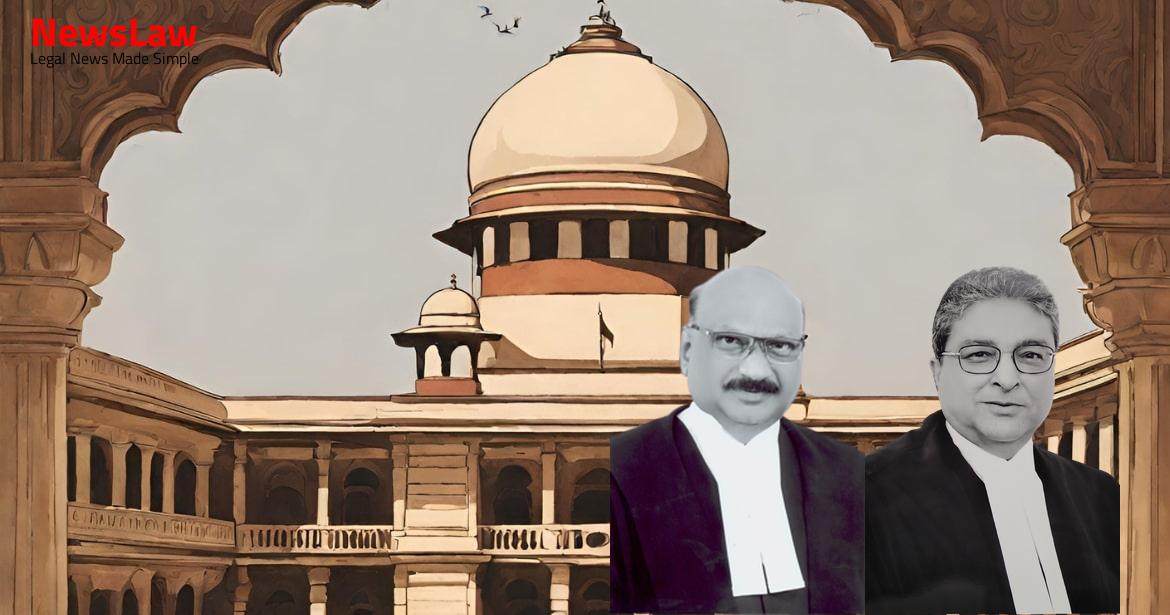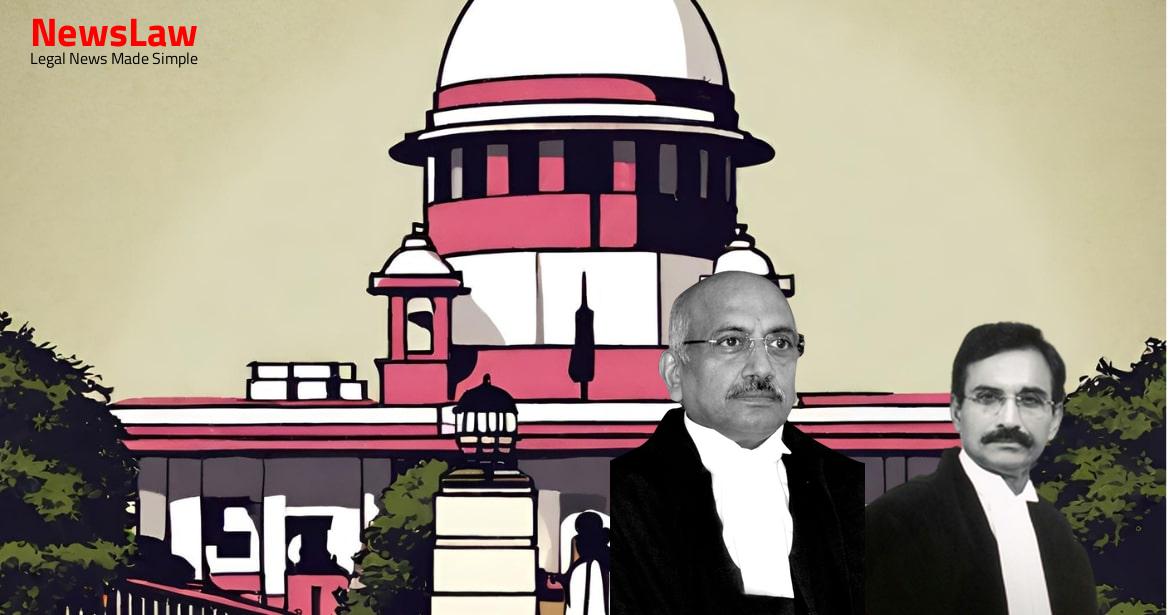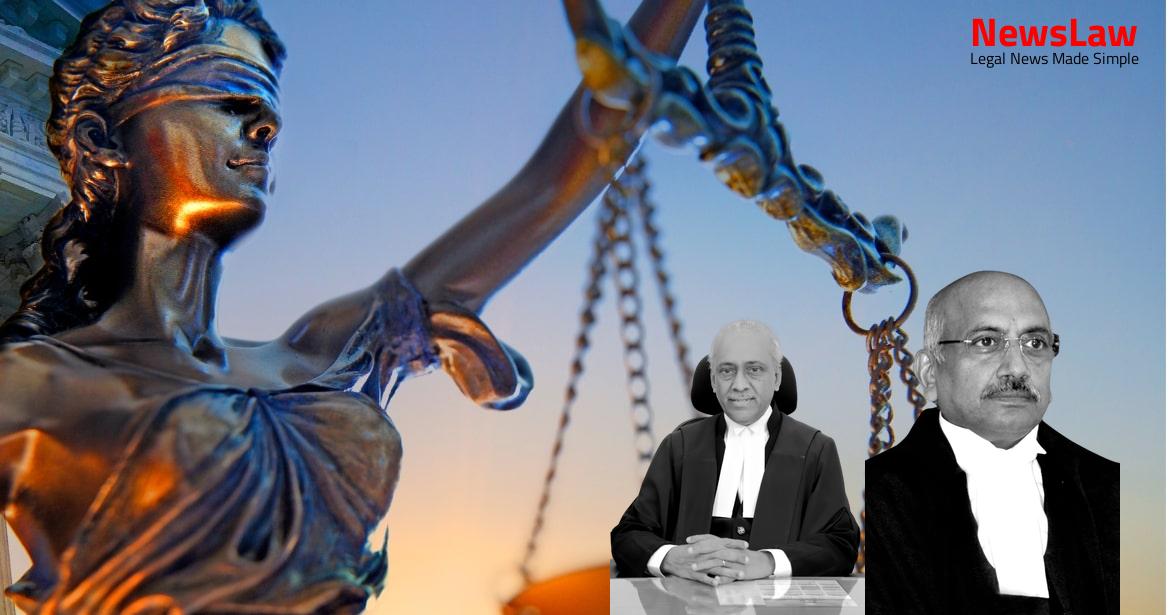Delve into the complexities of Rule 54 in disciplinary proceedings, where the court’s legal analysis plays a pivotal role in determining employee entitlements. This case summary sheds light on the importance of observing natural justice principles and the authority’s discretion in handling periods of absence or suspension. Stay tuned to unravel the implications of Rule 54 on employee rights and benefits.
Facts
- The respondent was originally penalized with three grade increments withheld with cumulative effect.
- The respondent filed a civil suit challenging the penalty and seeking promotion against vacancies from 1978-79 with all consequential benefits.
- No amount other than subsistence allowance was deemed payable as per the court order.
- The court ruled that the period of suspension should be considered as duty for pension purposes.
- The court allowed the respondent to receive full wages for the period of suspension and declared entitlement to the same.
- A subsequent appeal filed by the appellants was unsuccessful.
- The penalty of withholding increments was replaced with a penalty of censure under Rule 34 of the Rajasthan Civil Services Rules.
- Further departmental proceedings were initiated under Rule 54 of the Rajasthan Service Rules.
- The civil court directed a reassessment of the matter, leading to a writ petition by the respondent.
- The court invalidated the order denying full wages during suspension and treating the period of unemployment as a consequence of compulsory retirement, quashing the order.
- The respondents were instructed to reevaluate the petitioner’s candidacy for promotion to Assistant Engineer for the 1978-79 vacancies.
- The respondent obtained relief by substituting the penalty with censure.
- He filed a writ petition challenging the order under Rule 54 of the Rules.
- The learned Single Judge granted relief based on the judgment in Mangat Lal Sidana.
- No costs were ordered.
- The appeal by the appellants was unsuccessful.
Also Read: Legal Analysis of Assignment and Ratification in Property Law
Arguments
- Dr. Manish Singhvi, learned Additional Advocate General, argues that Rule 54 mandates full benefits in cases where the reinstated employee was proven blameless and a victim of harassment.
- If an employee is not fully exonerated, Rule 54(3) applies.
- Observance of natural justice principles is crucial for employees facing serious consequences.
- Respondents support the judgment due to non-compliance with natural justice principles.
- Dr. Manish Singhvi suggests remitting the case back to the competent authority for a fair decision.
- The court in a previous case had also remitted the matter back for a fair decision.
- The employee may not be entitled to full pay and allowances if not fully exonerated, as argued by Dr. Manish Singhvi.
- The nature of the penalty imposed was minor.
- The findings entered support the impugned judgment.
- No notice was issued to the respondents before passing the impugned order under Rule 54 of the Rules.
- Learned Amicus Curiae referenced Rule 54 regarding employee entitlement to full pay and allowances on exoneration.
- There is a difference in the case where the employee may not be receiving full pay and allowances.
Also Read: Interpretation of Custody in Contempt of Court Case
Analysis
- Rule 54 deals with disciplinary proceedings culminating in penalties like dismissal, removal, or compulsory retirement.
- If an employee is not fully exonerated, the period of absence may not be treated as duty unless specifically directed by the competent authority.
- The authority can convert the period of absence into leave if deemed fit.
- Rule 54 ensures principles of natural justice are observed in disciplinary proceedings.
- When reinstated after suspension, the authority must consider if the suspension was justified or unjustified before passing any order.
- If an employee is fully exonerated, they are entitled to full pay and allowances.
- The authority must pass specific orders regarding pay, allowances, and the treatment of the period of absence when reinstating an employee under Rule 54.
- Government servants may receive a proportion of pay and dearness allowance as prescribed by the competent authority in certain cases.
- Absence from duty may be treated as a period spent on duty in some situations.
- Absence from duty may not be considered as a period spent on duty unless directed by the competent authority, but can be converted into leave if desired by the government.
- Re-instatement of a government servant who was dismissed, removed, compulsorily retired, or suspended requires specific orders regarding pay and allowances during absence or suspension.
- The competent authority must determine if the government servant has been fully exonerated, and if so, full pay and dearness allowance are to be provided.
- The period of absence or suspension may or may not be treated as a period spent on duty, as decided by the competent authority.
- Suspension may not be unjustified, but there is a failure by the appellants.
- The exercise of notice to the employee must be done before taking any action.
- Payment of 50% of backwages was required for stay in the leading case.
- Remitting the case back for this purpose would be inequitable.
- Their cases fall within the scope of Rule 54(3).
- The exact amount of pay and allowances to be paid would be less than full pay and allowances.
- This takes their case outside Rule 54(2) of the Rules.
Also Read: NGT Jurisdiction and High Courts’ Role
Decision
- The appeals are partly allowed.
- The appeals are allowed as above.
- Respondents will be paid pay and allowances fixed at 50 per cent for the period of their absence.
- Respondents will receive pay and allowances at 50 per cent of what they would have been entitled to for the period in question.
Case Title: STATE OF RAJASTHAN Vs. MANGAT LAL SIDANA (2022 INSC 333)
Case Number: C.A. No.-002386-002386 / 2022



